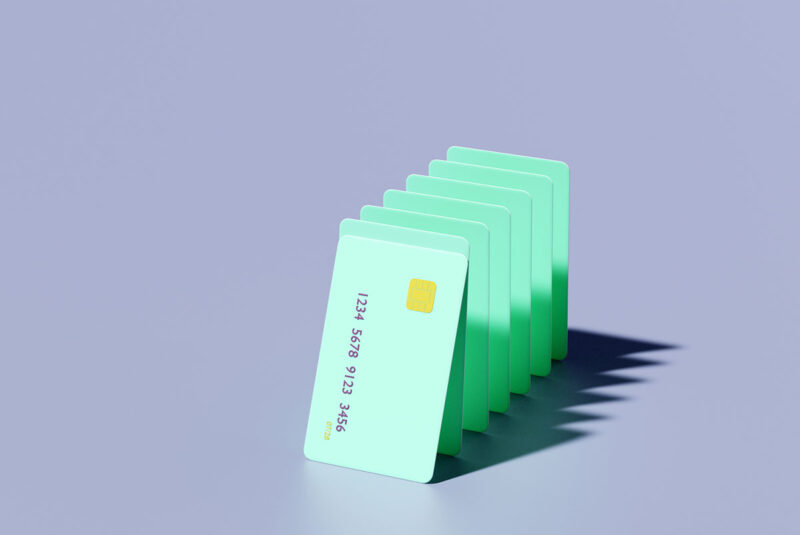Back in 2006, First National Bank of Marin was plagued with issues.
As Jennifer Surane reported at Bloomberg, “Federal investigators accused it of issuing credit cards to strapped consumers, then piling on so many fees and obligations that some new clients couldn’t buy a sandwich without hitting their credit limit.”
So it decided to give itself a makeover, changing its name to Credit One Bank and unveiling a logo with a swoosh above the “O.” Two years later, the massive financial corporation Capital One rebranded with a nearly identical logo.
“And so began the improbable story of how one of the top U.S. card lenders… gave an accidental advertising boost to a then-obscure rival,” Surane wrote.
Fast forward more than a decade, and if you’re looking for a credit card with bad credit, you’ve probably seen both names floating around. Here’s what you need to know about Credit One vs. Capital One — and why you should almost always choose one over the other.
If you confused Credit One for Capital One, you’re not the first.
What Do Credit One and Capital One Have in Common?
First, let’s touch on the companies’ similarities — which, TBH, will be a pretty short section.
Both Credit One and Capital One are American banks that issue credit cards.
Capital One is the fourth largest issuer of Visa and Mastercard credit cards, according to the Nilson Report. Credit One is No. 12, putting it ahead of banks such as TD Bank, BB&T, and Fifth Third. It is, by far, the fastest-growing card issuer in the top 15, issuing 15% more cards in 2019 than it did the previous year.
Both Credit One and Capital One also target “subprime borrowers” with spotty credit histories. Oh, and they also both have mobile apps.
Credit One vs. Capital One: 4 Major Reasons to Choose the Latter
When you visit MoneyTips, we want you to know that you can trust what’s in front of you. We are an authoritative source of accurate and relevant financial guidance. When MoneyTips content contains a link to partner or sponsor affiliated content, we’ll clearly indicate where that happens. Any opinions, analyses, reviews or recommendations expressed in our content are of the author alone, and have not been reviewed, approved or otherwise endorsed by the advertiser.
We make every effort to provide up-to-date information; however, we do not guarantee the accuracy of the information presented. Consumers should verify terms and conditions with the institution providing the products. Some articles may contain sponsored content, content about affiliated entities or content about clients in the network. While reasonable efforts are made to maintain accurate information, the information is presented without warranty.
Told you that’d be a short section! Now on to the many reasons why we believe Capital One is superior to Credit One.
We’re not Capital One evangelists, and we often think smaller banks and credit unions are a great choice — especially for people with bad credit. So, to be clear, we’re not saying Capital One is the best credit card issuer out there. What we are saying is, if you’re deciding between Credit One and Capital One, the latter is nearly always the better choice.
1. Wider range of products
Because it’s a major financial institution, Capital One offers a range of products, such as savings and checking accounts and auto loans. It also has credit cards to fit a variety of credit scores and needs, including student and business cards.
Not to mention, many of its credit cards offer rewards like ample cash back and sign-up bonuses, and high-end perks like Global Entry application fee credits and direct points transfers to airlines and hotels.
2. More branches
Capital One has more than 700 branches, including 30 “Capital One Cafes.”
Credit One, on the other hand, is an online-only institution that offers fewer than 10 credit cards, including one from NASCAR. While its cards are available to users with bad to excellent credit, we couldn’t imagine why you’d choose a Credit One card if you had other options. And, while some of Credit One’s cards offer cash back, none have perks comparable to Capital One’s.
3. Greater transparency
When you apply for a Capital One credit card, you’ll know what you’re getting as far as your chosen card’s interest rate, annual fee, and rewards.
But when you apply for a Credit One card, you’ll just have access to a set of sample terms and conditions that are “for informational purposes only.” (Here’s a 250-page list of the actual terms and conditions that come with its various cards.)
In order to see which Credit One card you might be eligible for, as well as its exact fees and rewards, you’ll need to first pre-qualify through a brief online application. Although this won’t affect your credit scores, it’s still an overly opaque process.
Once you get a Credit One card, the opacity doesn’t stop. After the first year, for example, you won’t know whether your annual fee will be billed in monthly installments or all at once.
4. Lower Fees
While you won’t know Credit One’s exact fees until you’ve pre-qualified for one of its cards, you can probably assume they’re going to be higher than Capital One’s.
For example, the Capital One Platinum Secured Credit Card, aimed at people with bad credit, charges no annual fee. All of Capital One’s credit cards are also free from foreign transaction fees, making them a great choice for traveling abroad.
In comparison, Credit One’s main card for users with bad credit is the Platinum Visa for Rebuilding Credit. Its annual fee is $0–$99, based on creditworthiness. We’d imagine the $0 fee is reserved for users with better credit — and if you’re in that group, you have an abundance of better cards to choose from. And even if you’re not, you can probably still get cards with lower annual fees from other issuers.
Here are some other high fees that Credit One charges that most other credit card companies offer for free):
- Authorized users: $19/year
- Credit limit increase: No exact amount is cited, though the terms say “We may impose a fee for processing the request.”
- Duplicate monthly statement: $10
- Replacement card: Up to $25
Insider tip
Some Credit One cards don’t even offer a grace period, which means you’ll start accruing interest as soon as you make a charge. With most other issuers, such as Capital One, you won’t accrue interest on your purchases until after your billing cycle’s due date — meaning you’ll never owe interest if you pay your statement balance in full each month.
5. Better customer service
Ready for the biggest reason to choose Capital One over Credit One? Customer service.
While no financial company is universally loved, Capital One is a major bank with modern infrastructure and normal standards of service. Its ConsumerAffairs rating is 3/5, based on 1,830 reviews submitted over the past year. Compare that to Credit One’s, which is 1/5, based on 184 reviews.
In J.D. Power’s 2019 credit card satisfaction study, Credit One received 728 of a possible 1,000 points — putting it in last place among 12 banks. Capital One tied with Chase for third, garnering 807 points.
To top it off, one NerdWallet investigation found that Credit One was the subject of more than 5,000 complaints with the Better Business Bureau, putting it in “the top 1% of financial companies that consumers complain to the bureau about most.”
Individuals reported a range of problems, including:
- Slow processing of payments, leading them to incur late payment fees even if they paid on time
- The inability to pay online, forcing them to pay via phone or mail — and therefore trigger additional fees
- Difficulty closing accounts, causing issues with their credit reports
Credit One’s terms and conditions also include this gem: “We may delay increasing your available credit by the amount of any payment that we receive for up to 12 calendar days.” So, say you have a credit limit of $300, which you max out. You make a payment of $200 because you want to use the card again soon. Credit One, however, may not make that $200 available for up to 12 days — keeping your card out of commission for nearly two weeks.
Insider tip
One upside? Since most Credit One cards run on the Visa network, you’ll receive Visa benefits, such as travel insurance and $0 fraud liability for unauthorized charges. Credit One cards also report your behavior to the three credit bureaus — Experian, TransUnion, and Equifax — which means that making on-time payments (if they let you!) will help build your credit.
The Best Alternative Cards for Rebuilding Credit
By now, you’ve probably gotten the message: Capital One trumps Credit One in basically every category. Even if you have bad credit — and have been targeted by Credit One — we’d advise you to apply for a Capital One card instead.
You may not get travel rewards (yet!), but you’ll be able take advantage of the credit-building capabilities of credit cards, without worrying about any shady business practices.
Credit One vs. Capital One: Frequently Asked Questions
Are Credit One and Capital One the same?
No! Credit One and Capital One are two totally different companies with very different approaches to the credit card business. They just happen to have similar names and logos.
What’s the difference between Credit One and Capital One?
Capital One is significantly larger and more prominent than Credit One. The issuer has garnered a strong reputation through high-quality credit products and generally good customer service. Capital One currently offers cards that complement a variety of lifestyles and credit scores, from dining-focused rewards cards to secured cards designed for applicants with bad credit.
Credit One is a smaller organization, and it usually targets customers with limited, poor, or no credit. The issuer’s cards are fairly stripped down, with few offering any notable rewards or perks, and they tend to come with high (and often unpredictable) fees.
Should I Get a Capital One Card?
If a Capital One credit card seems like a good fit, there’s no reason you shouldn’t apply. You can usually expect a solid product with straightforward terms, plus decent customer service.
Plus, unlike Credit One, Capital One offers cards that accommodate a wide variety of applicants, including not only those with poor or limited credit, but those with fair to excellent credit, too.
Should I Get a Credit One Card?
We strongly recommend you avoid applying for a Credit One card. Though the issuer’s products cater to customers with poor credit, there are plenty of much better options with lower fees and better features, whether you’re repairing damaged credit or building credit from scratch.
Cardholder reviews also suggest that the issuer’s customer service is exceptionally poor, which is a compelling reason to shy away.



